Rank on Google's first page in 3 months
Myths About SEO You Should Never Follow
Apr 11, 2024 | Athira K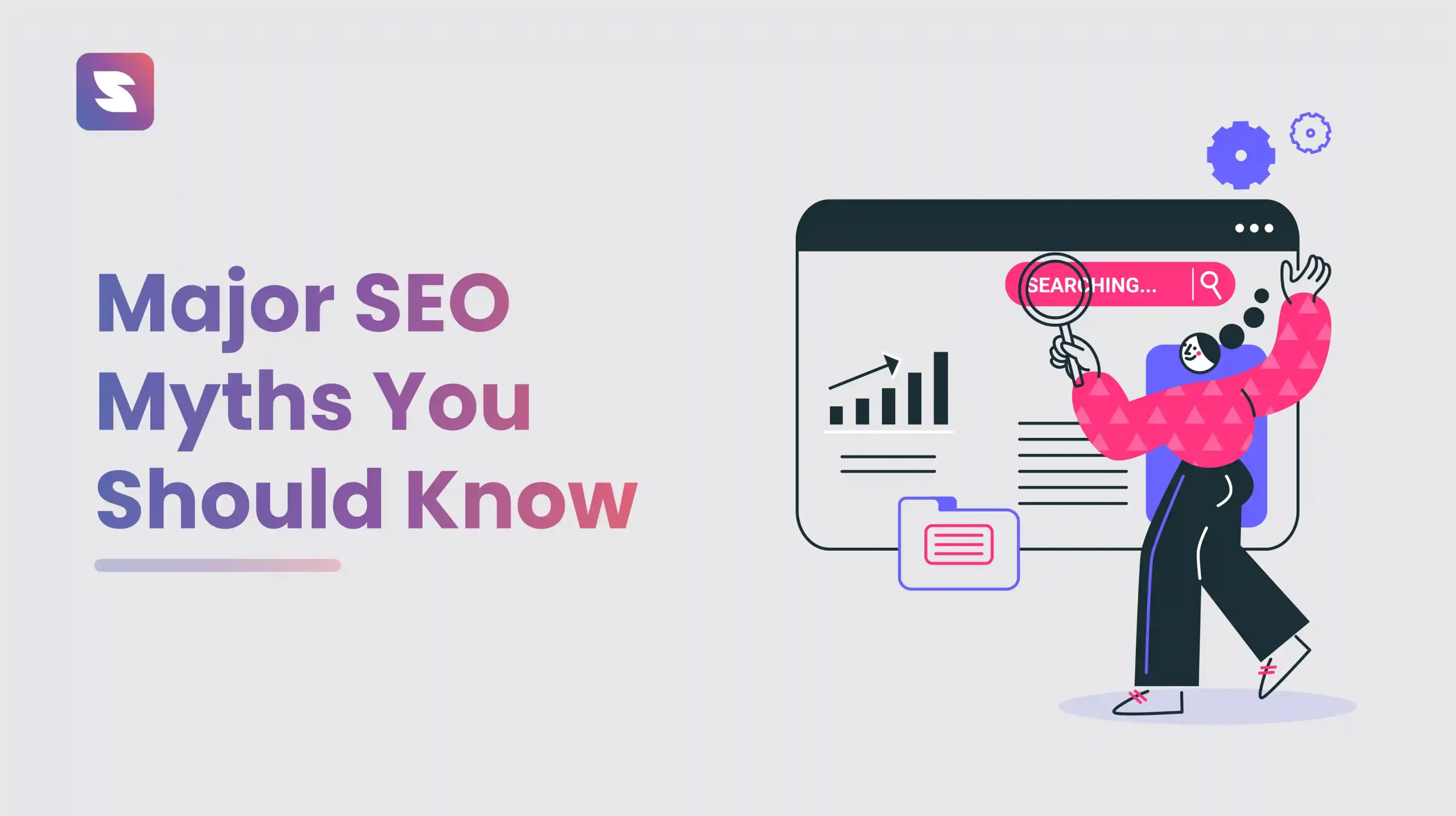
SEO is crucial for getting your website to show up on Google, but there’s so much advice out there that it’s easy to get confused.
What really works, and what doesn’t? When you learn more about SEO, you might be more confused than when you started.
We’re here to clear up the confusion and share the real SEO myths that keep floating around. The myths about SEO help you understand what you should focus on and what you can safely ignore so that you can make your website the best it can be.
12 SEO Myths That You Need To Know
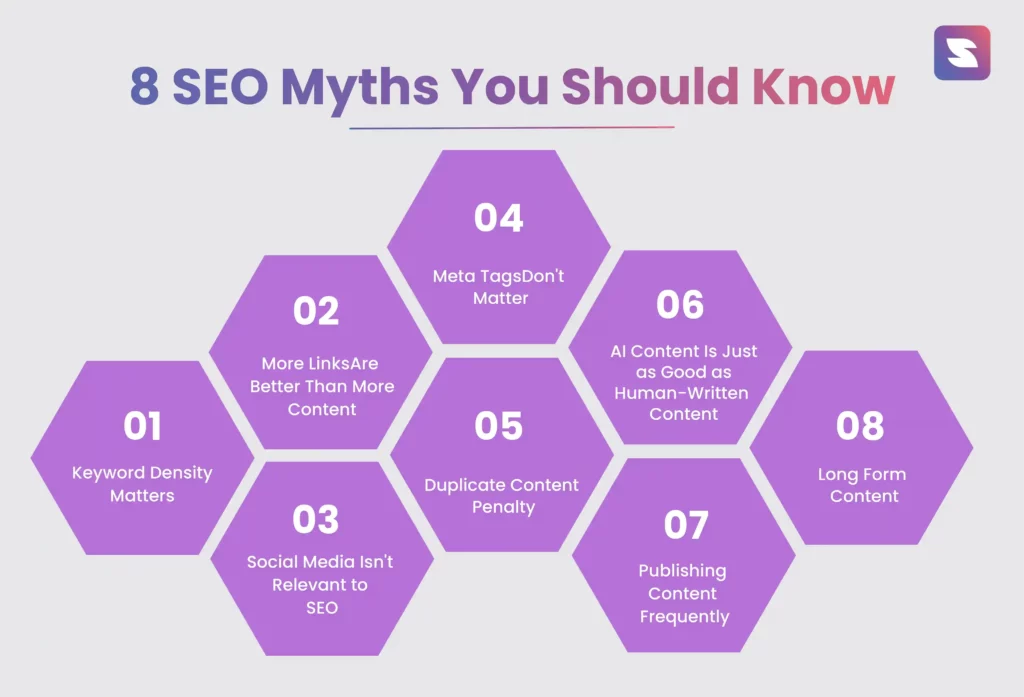
1. Keyword Density Matters
While keyword stuffing is indeed penalized, keywords themselves are still important.
Keywords are the search terms that help search engines understand the context of the content. The type of keywords must be used naturally and in alignment with high-quality, relevant content.
Keyword density refers to the no of times a keyword shows on a web page. That can divided by the total number of words on that page. Keyword density around 2% to 3% is good for SEO, and 4% to 5% is better.
This is a myth that always comes up in SEO, but the exact answer is that there is no optimal keyword density.
You can naturally write the content without counting or calculating the keyword density. Google has said many times that there is no keyword density for rankings. They only need quality content for the users. Don’t use the keyword as much as you want; that’s the cause of spamming.
Suggested Read: Best Keyword Research Tools for SEO
2. More Links Are Better Than More Content
Quality over quantity applies here.
A few high-quality backlinks from reputable sites are far more beneficial than numerous low-quality links. Similarly, producing valuable, relevant content is more important than merely having lots of content.
A good DA tells how trustworthy your website is for your users. It depends on some specific metric, like the quality of the backlink or estimated monthly traffic. You should check with these when taking up so many backlinks for your website.
3. Social Media Isn’t Relevant to SEO
Social signals may not directly influence rankings, but social media can significantly impact SEO indirectly. It increases visibility, drives traffic, and enhances brand recognition, all of which can affect search rankings over time.
Social media strategies indirectly impact SEO performance. It helps by increasing traffic to your website and generating backlinks. Use famous social media platforms like Facebook, LinkedIn, Instagram, YouTube, and Twitter.
It helps in many forms of SEO, like,
- Broaden your content reach
- Grow your website traffic
- Improve your backlink profile
- Increase your brand awareness
- Enhance SEO content plan
- Increase local search visibility
4. Meta Tags Don’t Matter
Meta tags were once a crucial ranking factor, but they are no longer as important. However, meta descriptions still play a role in click-through rates and can indirectly affect SEO by increasing website traffic.
Although meta tags are not the primary ranking factor they once were, they still play a critical role in SEO. A well-crafted meta title and description can increase click-through rates from search results.
Some tags need to focus on SEO for a better ranking, like
- Title tag
- Meta description
- Canonical Tag
- Alternative text (Alt) Tag
- Robots meta tag
- Social Media Meta Tags (Open Graph and Twitter Cards)
- Responsive Design Meta Tag
5. Duplicate Content Penalty
I, too, have heard this myth so many times: Your website will be penalized by Google if you are found copying content from another website. So, people didn’t understand the difference between algorithm suppression and manual action.
If you take any manual action or penalty that leads to a webpage being removed from Google’s index, you will get a notification in your Google Search Console.
Manual penalties are issued when Google’s human reviewers find that your site violates the Webmaster Guidelines. Algorithmic suppression happens when a filter from an algorithm prevents your page from ranking.
And the showcasing of the same content in the search results, the web page containing the copied content gets suppressed.
6. AI Content Is Just as Good as Human-Written Content
AI can produce content, but it lacks the genuine insight, expertise, and personal touch that human writers bring. Search engines are now getting better at identifying and penalizing low-quality AI-generated content.
Google is updating its algorithms, and the last algorithm update is affecting the ranking of content that isn’t quality. But this doesn’t mean all AI-generated content is penalized; they look into low-quality, lack-originality content.
Still, you can’t simply depend on AI to write content; you can get information from there, not entirely copied machine content.
Suggested Read: How to Use ChatGPT to Boost Your Content & SEO Strategy
7. Publishing Content Frequently Helps SEO
This is another myth of SEO: People say we have to publish more blogs frequently to get higher rankings in Google.
SEMrush has stats that show almost 25% of high-performing blogs publish content every day, and low-performing ones tend to publish less frequently. But the thing is that you don’t get rankings when publishing frequently. You have to clarify that you are not producing content for only the rankings.
You have to make your content strategy that should focus on meeting your target audience’s needs and requirements.
8. Long Form Content Increase Rankings
SEO experts say that long-form content and blog posts help in getting more traffic and rankings. And stats say that more than 1500 words of content tend to rank better in organic search.
It’s an SEO myth that longer articles rank better due to their length. And if you are writing a 1500-word blog with all the wrong content, that won’t rank. But if you are writing a 1000-word blog that contains all the topics, the convergence of all the points in your content that matched your search intent, and don’t focus on the word count.
Bonus Tip: Best SEO Tools For a Proper SEO Strategy
1. SuiteJar
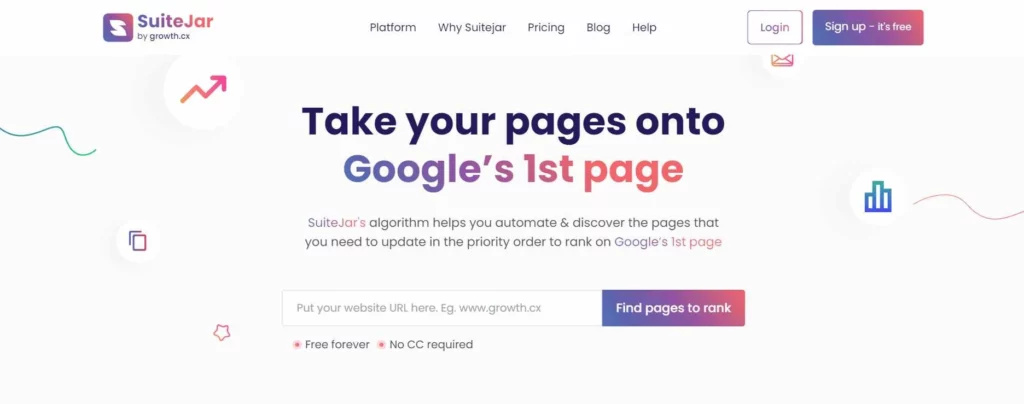
SuiteJar is the best content and SEO audit tool for helping you with your full SEO audit. It comes with features like Google First Page Ranker, easy web analytics, outdated pages, and a backlink checker. You will get a complete SEO audit with all the features you need to help with your SEO strategy.
- First-page ranker
This feature helps showcase pages with high potential for rankings. It gives insights that help you get the page in the first-page ranker. Enter the website, and it will provide you with details like the total number of pages, current traffic, projected traffic, impressions, and keywords.
- Easy web analytics
You can seamlessly integrate your GA4 account into this feature and get all your essential data in a single location. You get insights like high bounce rate, low bounce rate, high average spent, and low average spent. There is an option to export the data too.
- Competition Analysis
This feature allows you to research a thorough analysis of your competitor’s websites. You will get insights like DA, spam score, and organic traffic data. You can also get the details of every webpage on your website with the ranking keyword and the backlinks.
- Keyword Planner
Enter your targeted keyword in this feature to get data on keyword volume, SEO difficulty, CPC, and paid difficulty. You can also get insights into whether the keyword trends are growing.
SuiteJar Pricing
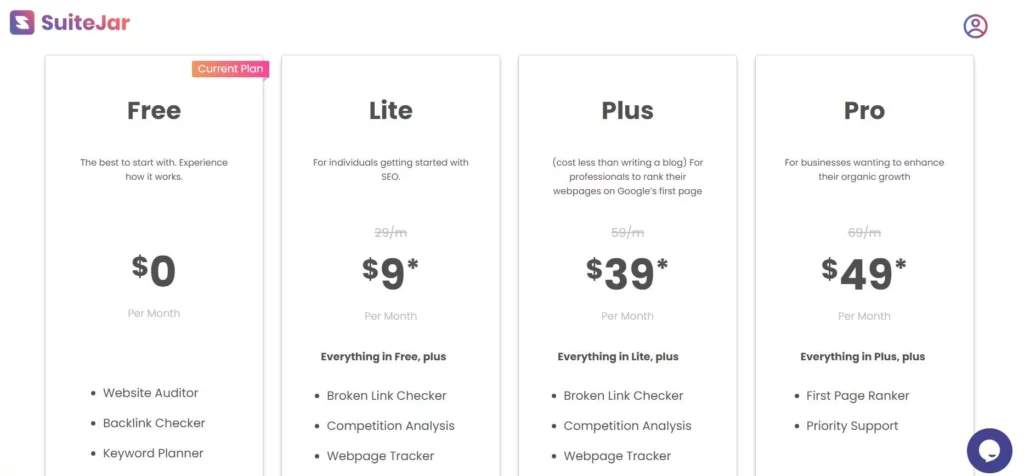
2. SEMrush
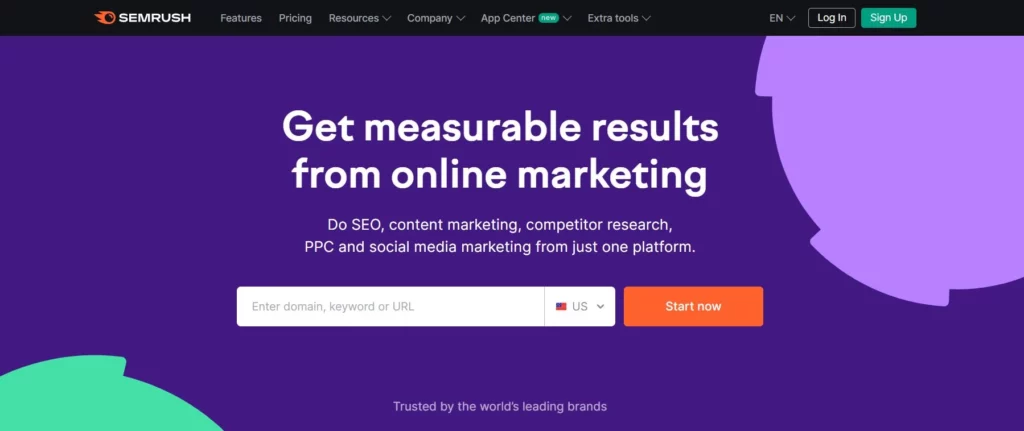
SEMrush is another SEO tool designed to cater to your SEO needs. It has features like keyword research, tracking website rankings across various search engines, and knowing the quality of backlinks pointing to the site. Whether you’re looking for a proper tool for your SEO approach, SEMrush provides the platform to support you.
3. Ahrefs
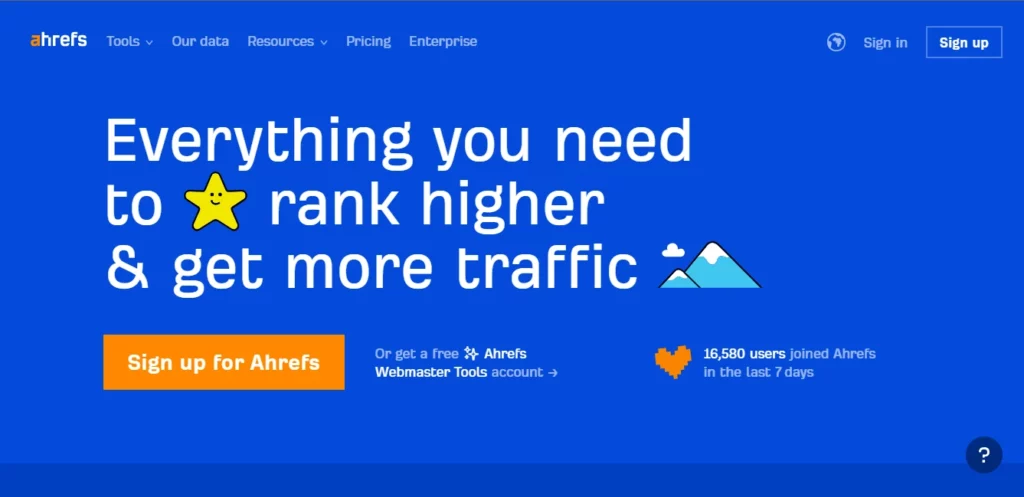
Ahrefs is a powerful SEO tool that focuses primarily on link building. It facilitates thorough keyword research, competitor analysis, and backlink exploration. A standout feature is its expansive database, which offers insights into the web’s linking structure. This makes Ahrefs an essential tool for SEO specialists. It helps to elevate their site’s authority and search engine rankings through strategic link acquisition.
Conclusion
Wrapping up the blog with some of the common SEO myths. The path to boosting your website’s Google presence is less about chasing after outdated tricks and more about sticking to solid, proven strategies.
SEO isn’t about tricking the system; it’s about playing a long-term strategy and always aiming to provide value. Focus on what your audience needs, keep your content fresh and engaging, and use affordable SEO tools to set up your strategy.